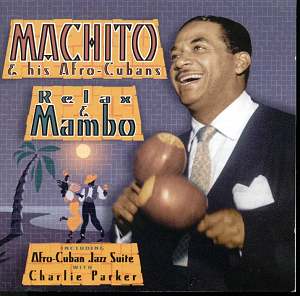Relax and Mabo
Sopa de Pichon
Tingo Talango
La Paella
No Noise
Mango Mangue
Okiedoke
Tanga
Mambo, Mucho Mambo
Si, si, no, no
Jungle Drums
Asia Minor
Un Poquito de tu Amor
Afro-Cuban Jazz Suite
Mamboscope
Consternacion
Feeding the Chickens
Mambo Sentimental
Machito and his Afro-Cubans featuring Charlie
Parker and Flip Phillips
Recorded 1942-1954
The nexus between Jazz and
Afro-Cuban music reached its apogee in Machito’s
band. Already experienced in Latin bands in
New York the Florida-born son of a Cuban cigar
manufacturer had clearly absorbed swing elements
early. The unknown personnel of the first
track, Relax and Mambo, features a
jump alto player of rhythmic vitality – might
he have been Johnny Nieto who was part of
the 1942 band which recorded for Decca? Whoever
he was he showed the kind of instrumental
finesse that members of Machito’s band were
expected to display – in contradistinction
perhaps to the element of routine evoked by
other genre bands. Try the neo-classical introduction
to Sopa de Pichon for an example of
this kind of elegance.
Machito invariably had eloquent
pianists – first Gilberto Ayala and then the
even better René Hernández.
With bongos and congas to the percussive fore
this was a formidably equipped band and one
that piqued the interest of jazzmen interested
in the broadening base of stylistic influence
offered by such an association. Hence Flip
Phillips’s frequent collaborations on disc
and the even more august pairing with Charlie
Parker – though there are less heralded appearances
by Sweets Edison, who plays third trumpet
in the 1950 recording of the Afro-Cuban
Jazz Suite.
In truth Phillips’s efforts
are somewhat unfocused; with better, more
commanding arrangements Parker tears into
his material with unabashed virtuosity. Elsewhere
he’s matched – if that’s the right word –
by the virtuosic sexual insinuations of vocalist
Graciela in Sí, sí, no no,
a song that certainly wouldn’t have made
it onto the BBC playlist in 1949. An example
of doubling comes in Asia Minor where
I think someone is playing the oboe. The Jazz
Suite is only intermittently convincing however;
the first of the five movements inclines to
conventional light music then anything genuinely
creative. It’s when Parker drives the material
that the music is elevated beyond its natural
realm – and is then brought right back down
to earth by the idiotic drumming of Buddy
Rich.
Still, there are plenty of
interesting developments here and sheer straight
ahead fun as well. Rather wearying in one
go of course, so to be taken mambo by mambo.
Jonathan Woolf
